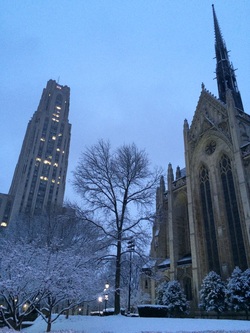Knowledge and Information

It's February at the University of Pittsburgh, where I go to school. Every day on my way in to campus, I pass the sight in the picture to the left, the monolithic Cathedral of Learning, a veritable bulwark of academia, jutting up next to the spired and beautiful Heinz Memorial Chapel.
I love this juxtaposition, for the architecture first and foremost, but also for the visual metaphor. The Cathedral of Learning houses over thirty floors of classroom, office, and study space. It's a wonderful place to get an education. A lot of us in the humanities like to bemoan the fact that our fields of study seem to have taken a back seat to the sciences in the modern university. Science is the cutting edge of knowledge; it seems we, on the other hand, are always looking back. We interrogate the philosophies, theologies, and practices of the past to understand the present, how we got here. It's not so different from what the evolutionary biologists, even the astronomers and cosmologists, are doing, but the methods and materials seems more unsure—less objective. And if there's anything I think we academics are prejudiced towards these days, it's objectivity. But of course, the things we can know obectively just can't be the whole story. Some question whether we can know anything objectively, since of course, all research always just comes down to individual humans with individual biases sorting what matters from what doesn't. How do we know what we know? Science is a tour-de-force of knowledge creation, always bringing new understanding into being and always revising the understanding that exists. It's even changed our knowledge of God and God's universe, if you believe knowing more about creation means knowing more about its creator. Then of course, there are things we know that it seems science can never touch, cannot shed more light on even when it tries. How could a scientist measure and explain, with a more elegant theory than the fact, itself, the love we have for our partners and families? How can we explain the existence of beauty, or belief? This issue is dedicated to questions of how we come to know what we know—about nature, our selves, and of course, the God we love. In it, Randy Isaac and Mark Shelhamer give wonderfully accessible and enlightening accounts of what information and knowledge means to many of our top scientists and technologists, today. Walt Hearn and Mike Clifford build on that theme with a humorous and personal touch. Stonehill College student Olivia Peterson interviews science/faith author Karl Giberson on questions of chance, providence, and the comprehensibilty of a universe where God allows freedom in creation yet knows and directs outcomes and processes. Ruth Hoppin's imaginative poems, and Carol Ruppel's lovely and meditative photo essay take us through strange and beautiful landscapes to those interior places where our minds can rest and rejuvenate. And ASA/CSCAers, don't miss Jamin Hubner's insightful commentary on last year's annual meeting and the meaning of interdisciplinarity! Thank you, as always, for visiting and for your support. Upcoming themes in God & Nature magazine include: Animals and the Image of God; Doubt and Searching; Technology and the Church; and Quantum Physics, Epigenetics, and God. Email Emily at [email protected] for info and inquiries. |
Emily Ruppel has been writing novels since she was five years old, beginning with Blacky, (about a black horse), and quickly followed by Blacky Out West, neither of which can be purchased on Amazon.com.
Yet. Until that day comes, Emily will be living and working in Pittsburgh as a doctoral student in the Rhetoric of Science program at Pitt. If you've ever heard someone say, "The data speak for themselves," then you might know what's at the heart of Emily's research when she says: "No, they don't." Before heading to Pittsburgh, Emily enjoyed serving as the Associate Director of Communications for the American Scientific Affiliation and as Web Editor for The BioLogos Foundation. She continues the editing and publishing of God & Nature magazine as a freelance project for the ASA. Contact Emily with questions and comments at: [email protected] |


